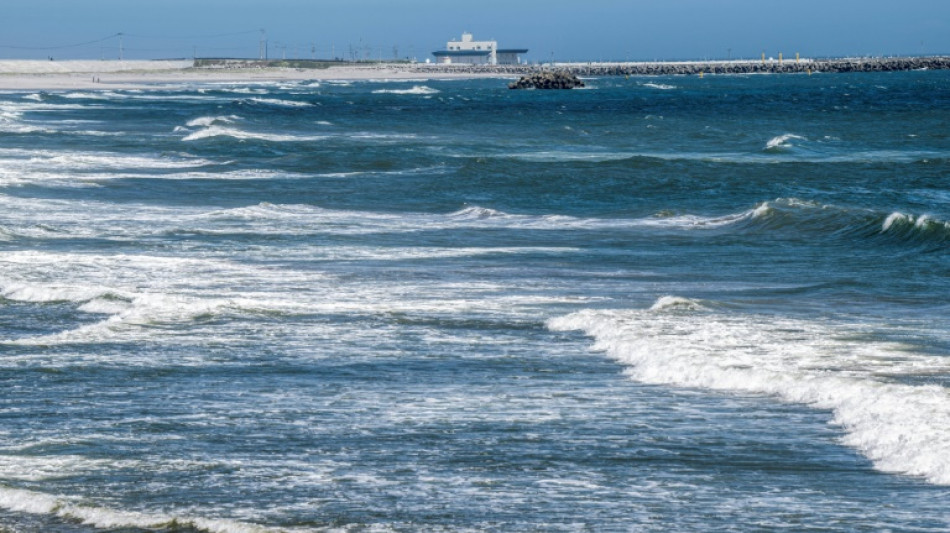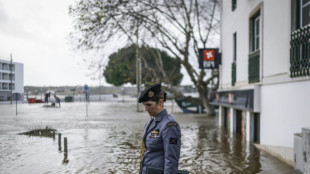
-
 German exports to US plunge as tariffs exact heavy cost
German exports to US plunge as tariffs exact heavy cost
-
Portugal heads for presidential vote, fretting over storms and far-right

-
 Suicide blast at Islamabad mosque kills at least 30, wounds over 130: police
Suicide blast at Islamabad mosque kills at least 30, wounds over 130: police
-
Russia says Kyiv behind Moscow shooting of army general

-
 Greenland villagers focus on 'normal life' amid stress of US threat
Greenland villagers focus on 'normal life' amid stress of US threat
-
Iran, US hold talks in Oman after Trump military threats

-
 Stocks waver as tech worries build
Stocks waver as tech worries build
-
Dupont, Jalibert click to give France extra spark in Six Nations bid

-
 'Excited' Scots out to prove they deserve T20 World Cup call-up
'Excited' Scots out to prove they deserve T20 World Cup call-up
-
EU tells TikTok to change 'addictive' design

-
 India captain admits 'there will be nerves' at home T20 World Cup
India captain admits 'there will be nerves' at home T20 World Cup
-
Stellantis takes massive hit for 'overestimation' of EV shift

-
 'Mona's Eyes': how an obscure French art historian swept the globe
'Mona's Eyes': how an obscure French art historian swept the globe
-
Iran, US hold talks in Oman

-
 Iran, US hold talks in Oman after deadly protest crackdown
Iran, US hold talks in Oman after deadly protest crackdown
-
In Finland's forests, soldiers re-learn how to lay anti-personnel mines

-
 Israeli president visits Australia after Bondi Beach attack
Israeli president visits Australia after Bondi Beach attack
-
In Dakar fishing village, surfing entices girls back to school

-
 Lakers rally to beat Sixers despite Doncic injury
Lakers rally to beat Sixers despite Doncic injury
-
Russian pensioners turn to soup kitchen as war economy stutters

-
 Japan taps Meta to help search for abuse of Olympic athletes
Japan taps Meta to help search for abuse of Olympic athletes
-
As Estonia schools phase out Russian, many families struggle

-
 Toyota names new CEO, hikes profit forecasts
Toyota names new CEO, hikes profit forecasts
-
Next in Putin's sights? Estonia town stuck between two worlds

-
 Family of US news anchor's missing mother renews plea to kidnappers
Family of US news anchor's missing mother renews plea to kidnappers
-
Spin woes, injury and poor form dog Australia for T20 World Cup

-
 Japan's Liberal Democratic Party: an election bulldozer
Japan's Liberal Democratic Party: an election bulldozer
-
Hazlewood out of T20 World Cup in fresh blow to Australia

-
 Japan scouring social media 24 hours a day for abuse of Olympic athletes
Japan scouring social media 24 hours a day for abuse of Olympic athletes
-
Bangladesh Islamist leader seeks power in post-uprising vote

-
 Rams' Stafford named NFL's Most Valuable Player
Rams' Stafford named NFL's Most Valuable Player
-
Japan to restart world's biggest nuclear plant

-
 Japan's Sanae Takaichi: Iron Lady 2.0 hopes for election boost
Japan's Sanae Takaichi: Iron Lady 2.0 hopes for election boost
-
Italy set for 2026 Winter Olympics opening ceremony

-
 Hong Kong to sentence media mogul Jimmy Lai on Monday
Hong Kong to sentence media mogul Jimmy Lai on Monday
-
Pressure on Townsend as Scots face Italy in Six Nations

-
 Taiwan's political standoff stalls $40 bn defence plan
Taiwan's political standoff stalls $40 bn defence plan
-
Inter eyeing chance to put pressure on title rivals Milan

-
 Arbeloa's Real Madrid seeking consistency over magic
Arbeloa's Real Madrid seeking consistency over magic
-
Dortmund dare to dream as Bayern's title march falters

-
 PSG brace for tough run as 'strange' Marseille come to town
PSG brace for tough run as 'strange' Marseille come to town
-
Japan PM wins Trump backing ahead of snap election

-
 AI tools fabricate Epstein images 'in seconds,' study says
AI tools fabricate Epstein images 'in seconds,' study says
-
Asian markets extend global retreat as tech worries build

-
 Sells like teen spirit? Cobain's 'Nevermind' guitar up for sale
Sells like teen spirit? Cobain's 'Nevermind' guitar up for sale
-
Thailand votes after three prime ministers in two years

-
 UK royal finances in spotlight after Andrew's downfall
UK royal finances in spotlight after Andrew's downfall
-
Diplomatic shift and elections see Armenia battle Russian disinformation

-
 Undercover probe finds Australian pubs short-pouring beer
Undercover probe finds Australian pubs short-pouring beer
-
Epstein fallout triggers resignations, probes


Six bn tonnes of sand extracted from world's oceans each year: UN
Some six billion tonnes of sand and other sediment is extracted from the world's seas and oceans every year, the UN said Tuesday, warning of the devastating toll on biodiversity and coastal communities.
Launching the first ever global data platform on sediment extraction in marine environments, the United Nations Environment Programme (UNEP), warned that the scale of dredging was growing, with dire consequences.
"The scale of environmental impacts of shallow sea mining activities and dredging is alarming," said Pascal Peduzzi, who heads UNEP's analytics centre GRID-Geneva.
He pointed to the effects on biodiversity, as well as on water turbidity, and noise impacts on marine mammals.
The new data platform, Marine Sand Watch, uses artificial intelligence to track and monitor dredging activities of sand, clay, silt, gravel and rock in the world's marine environment.
It uses so-called Automatic Identification System (AIS) signals for ships combined with AI to identify the operations of dredging vessels, including in hotspots like the North Sea and the east coast of the United States.
The signals emitted by the vessels allow "access to the movements of every ship on the planet," Peduzzi told AFP, adding that AI makes it possible to analyse the mountains of data gathered.
That process is still in the early stages, and so far, only around 50 percent of vessels are being monitored.
- 'Gigantic proportions' -
But the platform estimates that out of some 50 billion tonnes of sand and gravel used by humanity each year, between four and eight billion tonnes come from the world's oceans and seas.
"This represents six billion tonnes on average every year, or the equivalent of more than one million dump trucks every day," Peduzzi said.
He pointed out that "our entire society depends on sand as a construction material", to make everything from schools, hospitals and roads to hydroelectric damns, solar panels and glass.
At the same time, sand plays a vital environmental role, including to protect coastal communities from rising sea levels.
The UN is aiming to publish the 2020-23 figures by the end of this year.
But it is already clear that these activities are not slowing down, but rather are "taking on gigantic proportions", Peduzzi said.
He warned that the world is approaching the natural replenishment rate of 10-16 billion tonnes of sediment washed into the world's oceans each year.
- 'Not sustainable' -
While the tipping point has not been reached at a global level, he cautioned during a press conference that in some localities, "we are extracting it faster than it can replenish itself".
"This is not sustainable."
The North Sea, Southeast Asia and the East Coast of the United States are among the areas with the most intense marine dredging.
China, followed by the Netherlands, the United States and Belgium meanwhile have the biggest dredging fleets, Arnaud Vander Velpen, a GRID-Geneva sand industry expert, told reporters.
Peduzzi described extraction vessels as giant vacuums, cleaning seabeds, and "sterilising" them, warning that this leads to the disappearance of oceanic micro-organisms and threatens biodiversity.
Beyond presenting its figures, the UN said it hoped the new platform could lead to discussions with the sector, pushing businesses to move in a more environmentally friendly direction and improve their extraction practices.
UNEP said there was an urgent need for better management of marine sand resources and to reduce the impacts of shallow sea mining.
It pointed to dramatically varying practices and regulations, urging international rules for dredging techniques.
It also recommends banning sand extraction from beaches due to the important role such beaches play for coastal resilience, the environment and economies.
C.Hamad--SF-PST




